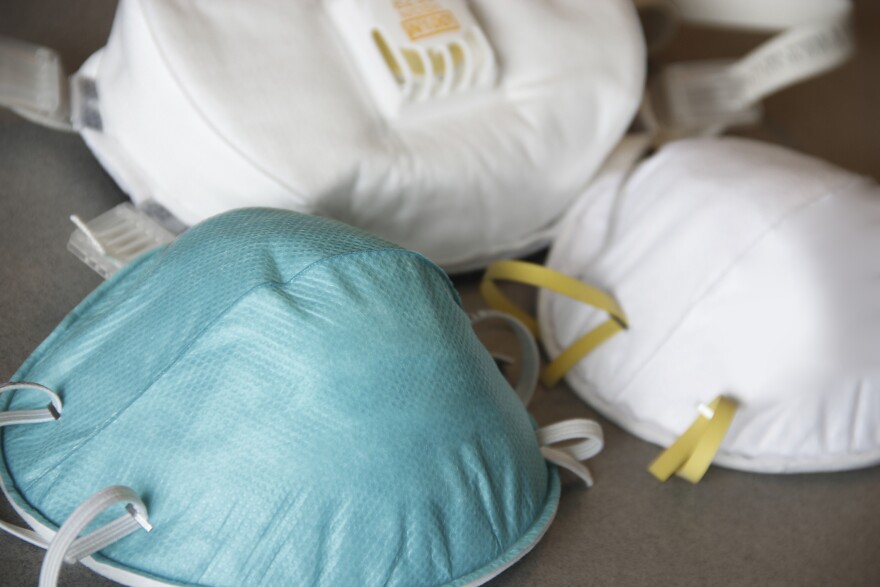Democratic Congresswoman Elissa Slotkin plans to introduce legislation to increase the United States’ ability to manufacture and supply personal protective equipment to hospitals and healthcare workers.
Slotkin says the United States is over-reliant on international supply chains that depend on suppliers in foreign countries to ship the vitally important protective gear to healthcare workers in the U.S. Her legislation would require all federal government agencies to by medical supplies manufactured in the United States, in a bid to encourage manufacturers to produce more of the supplies domestically.
“The Department of Defense can’t just go buying military equipment from all over the world. They have a specific Buy American provision they have to live up to,” Slotkin said. “We took those same provisions and we applied to another supply chain with national security implications – our medical supply chain.”

The three bill-package would also transfer control of the Strategic National stockpile to the Department of Defense. Slotkin says the DOD has the proven ability to maintain supply stockpiles and plan to add surge-capacity in times of great need. The supplies from the stockpile have been disappointing to some. Governor Gretchen Whitmer said Michigan’s recent shipment of PPE from the stockpile was “only enough to cover one shift.”
Another bill would require the creation of a library of FDA-approved plans and specs for emergency supplies that Slotkin says would make it easier to ramp-up manufacturing of critical items during a crisis.
Concerns of shortages of personal protective equipment (PPE) have led some hospitals in Michigan to re-use N95 masks. Slotkin says since the coronavirus pandemic reached the United States she’s been frantically finding ways to get PPE supplies to hospitals and healthcare workers in her southeast Michigan district.
Slotkin says as the outbreak in the United States got worse, PPE supplies were harder to find. She says most of the global supply – particularly of N95 masks – is in China. Suddenly, states and hospitals were bidding against each other, competing for scarce PPE supplies.
“It became kind of like the Wild West,” Slotkin said. “It was just hard for me to fathom, but we were just totally dependent on the whims of folks who ran these factories in China.”
Slotkin says there were rumors representatives of the Chinese government were intervening to decide where PPE deliveries were shipped.
“I never want to be dependent on anyone else,” Slotkin said. “I come from the Defense Department where we so clearly would never allow that on anything for the U.S. military. It just struck me as deeply flawed that we hadn’t thought about it for our health care workers.
PPE shortages have forced some healthcare workers to use improvised or home-made protective gear. Researchers at Michigan State University are waiting for FDA approval on a process to sanitize and re-use N95 masks, an extraordinary step for items designed for one-time use. Slotkin supports that effort and is urging the FDA to grant swift approval of the process.

Some hospitals believe they do have the equipment needed to weather the coronavirus pandemic, though it’s impossible to know when a spike in COVID-19 cases could create a surge of demand that will be hard to meet using the current supply chains in place.
Some companies that manufacture other consumer goods have transitioned to producing PPE during the coronavirus pandemic. Some distilleries are producing hand sanitizer. Slotkin’s team maintains an Excel spreadsheet of companies in her district that have switched to manufacturing PPE.
Slotkin says requiring U.S. government agencies to purchase domestically produced medical supplies will make it more profitable for manufacturers in the United States to produce PPE goods by insulating them from competition with foreign companies which may be able to manufacture PPE at lower cost.
“It’s going to mean that our companies that are now making these supplies are like, 'Huh, I have a market for this.'”
As Congress develops plans for a fourth coronavirus-era economic stimulus package, Slotkin says she hopes some of her PPE supply chain legislation could be included in that deal. If not, she hopes to separately get a vote on this bills in the house. She hopes her plans will gain bipartisan support, as everyone has witnessed the problems with the PPE supply chain exposed by the pandemic.
“It’s important to me that this is bipartisan and that we have a strong showing of support among members of Congress.”
In 2017, a paper in the journal Health Security warned the United States’ reliance on off-shore suppliers for PPE could result in challenges meeting demand during a public health emergency.







